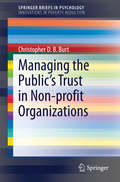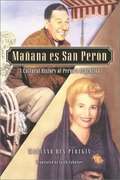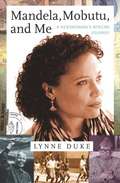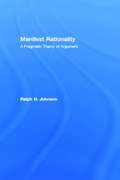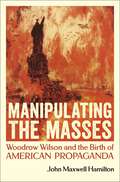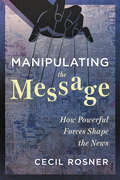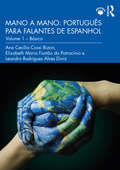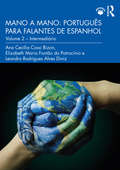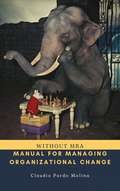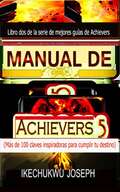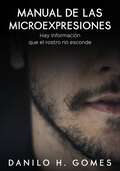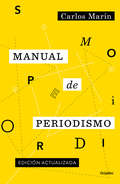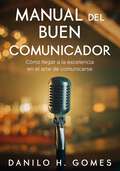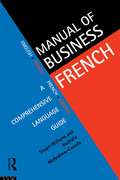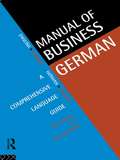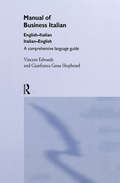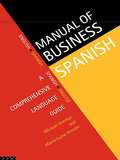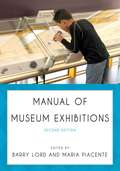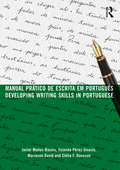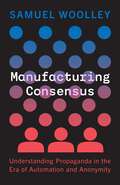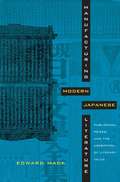- Table View
- List View
Managing the Public's Trust in Non-profit Organizations
by Christopher D.B. BurtGlobally there is growing concern over charities abilities to raise funds. This is of concern to both charity organizations and policy makers. One of the key factors that determine the public's willingness to provide funds (to donate) is trust in both specific charity organizations and the sector in general. A significant amount of research from a number of disciplines has pointed to ways in which the public's trust can be generated and maintained. Bring this research into a single source will provide a valuable guide for both individual charity organizations and policy makers.
Manana Es San Peron: A Cultural History of Peron's Argentina
by Mariano Ben PlotkinThe regime of Juan Peron is one of the most studied topics of Argentina's contemporary history. This new book - an English translation of a highly popular, critically acclaimed Spanish language edition- provides a new perspective on the intriguing Argentinian leader. Mariano Plotkin's cultural approach makes Peron's popularity understandable because it goes beyond Peron's charismatic appeal and analyzes the Peronist mechanisms used to generate political consent and mass mobilization. Manana es San Peron is the first book to focus on the cultural and symbolic dimensions of Peronism and populism. Plotkin also presents important material for the study of populism and the modern state in this region. Manana es San Peron explores the creation of myths, symbols, and rituals which constituted the Peronist political imagery. This political imagery was not designed to reinforce the legitimacy of a political system defined in abstract terms, but to assure the undisputed loyalty of different sectors of society to the Peronist government and to Peron himself. The evolution of the institutional framework that made the creation of this symbolic apparatus possible is also discussed. This well-researched book shows the methods designed by the Peronist regime to broaden its social base through the incorporation and activation of groups which had traditionally occupied a marginalized position within the political system-non-union workers, women, and the poor. Plotkin investigates how Peron used the education system to build his popularity. He examines the public assistance programs financed through the Eva Peron Foundation, and demonstrates how they were used to politicize women for the first time. He explains how Eva Peron and the Peronist regime not only tried to gain the support of women as voters but also as potential 'missionaries' who would spread the Peronist word in the privacy of their homes. This well-written and engaging account of one of Latin America's most colorful and appealing leaders is an excellent resource on Argentina and Latin American history and politics.
Mandela, Mobutu, and Me: A Newswoman's African Journey
by Lynne DukeIn this stunning memoir, veteran Washington Post correspondent Lynne Duke takes readers on a wrenching but riveting journey through Africa during the pivotal 1990s and brilliantly illuminates a continent where hope and humanity thrive amid unimaginable depredation and horrors. For four years as her newspaper's Johannesburg bureau chief, Lynne Duke cut a rare figure as a black American woman foreign correspondent as she raced from story to story in numerous countries of central and southern Africa. From the battle zones of Congo-Zaire to the quest for truth and reconciliation in South Africa; from the teeming displaced person's camps of Angola and the killing field of the Rwanda genocide to the calming Indian Ocean shores of Mozambique. She interviewed heads of state, captains of industry, activists, tribal leaders, medicine men and women, mercenaries, rebels, refugees, and ordinary, hardworking people. And it is they, the ordinary people of Africa, who fueled the hope and affection that drove Duke's reporting. The nobility of the ordinary African struggles, so often absent from accounts of the continent, is at the heart of Duke's searing story. MANDELA, MOBUTU, AND ME is a richly detailed, clear-eyed account of the hard realities Duke discovered, including the devastation wrought by ruthless, rapacious dictators like Mobutu Sese Seko and his successor, Laurent Kabila, in the Congo, and appalling indifference of Europeans and Americans to the legacy of their own exploitation of the continent and its people. But Duke also records with admiration the visionary leadership and personal style of Nelson Mandela in south Africa as he led his country's inspiring transition from apartheid in the twilight of his incredible life. Whether it was touring underground gold and copper mines, learning to carry water on her head, filing stories by flashlight or dodging gunmen, Duke's tour of Africa reveals not only the spirit and travails of an amazing but troubled continent -- it also explores the heart and fearlessness of a dedicated journalist.
Manhattan, When I Was Young: A Memoir
by Mary CantwellA &“wonderful memoir&” of a woman&’s life as a fashion-magazine writer in 1950s and &’60s New York (Publishers Weekly). Mary Cantwell arrived in Manhattan one summer in the early 1950s with eighty dollars, a portable typewriter, a wardrobe of unsuitable clothes, a copy of The Poems of Gerard Manley Hopkins, a boyfriend she was worried might be involved with the Communists, and no idea how to live on her own. She moved to the Village because she had heard of it, and worked at Mademoiselle because that was where the employment agency sent her. In this evocative and unflinching book, Cantwell recalls the city she knew back then by revisiting five apartments in which she lived. Her memoir vividly recreates both a particular golden era in New York City and the sometimes painful, sometimes exhilarating process of forging a self.
Manifest Rationality: A Pragmatic Theory of Argument
by Ralph H. JohnsonThis book works through some of the theoretical issues that have been accumulating in informal logic over the past 20 years. At the same time, it defines a core position in the theory of argument in which those issues can be further explored. The underlying concern that motivates this work is the health of practice of argumentation as an important cultural artifact. A further concern is for logic as a discipline. Argumentative and dialectical in nature, this book presupposes some awareness of the theory of argument in recent history, and some familiarity with the positions that have been advanced. It will be of interest to academics, researchers, and advanced undergraduate and graduate students in the disciplines of logic, rhetoric, linguistics, speech communication, English composition, and psychology.
Manipulating the Masses: Woodrow Wilson and the Birth of American Propaganda
by John Maxwell HamiltonWinner of the Goldsmith Book Prize by the Harvard Shorenstein Center on Media, Politics and Public PolicyManipulating the Masses tells the story of the enduring threat to American democracy that arose out of World War I: the establishment of pervasive, systematic propaganda as an instrument of the state. During the Great War, the federal government exercised unprecedented power to shape the views and attitudes of American citizens. Its agent for this was the Committee on Public Information (CPI), established by President Woodrow Wilson one week after the United States entered the war in April 1917.Driven by its fiery chief, George Creel, the CPI reached every crevice of the nation, every day, and extended widely abroad. It established the first national newspaper, made prepackaged news a quotidian aspect of governing, and pioneered the concept of public diplomacy. It spread the Wilson administration’s messages through articles, cartoons, books, and advertisements in newspapers and magazines; through feature films and volunteer Four Minute Men who spoke during intermission; through posters plastered on buildings and along highways; and through pamphlets distributed by the millions. It enlisted the nation’s leading progressive journalists, advertising executives, and artists. It harnessed American universities and their professors to create propaganda and add legitimacy to its mission.Even as Creel insisted that the CPI was a conduit for reliable, fact-based information, the office regularly sanitized news, distorted facts, and played on emotions. Creel extolled transparency but established front organizations. Overseas, the CPI secretly subsidized news organs and bribed journalists. At home, it challenged the loyalty of those who occasionally questioned its tactics. Working closely with federal intelligence agencies eager to sniff out subversives and stifle dissent, the CPI was an accomplice to the Wilson administration’s trampling of civil liberties.Until now, the full story of the CPI has never been told. John Maxwell Hamilton consulted over 150 archival collections in the United States and Europe to write this revealing history, which shows the shortcuts to open, honest debate that even well-meaning propagandists take to bend others to their views. Every element of contemporary government propaganda has antecedents in the CPI. It is the ideal vehicle for understanding the rise of propaganda, its methods of operation, and the threat it poses to democracy.
Manipulating the Message: How Powerful Forces Shape the News
by Cecil RosnerJournalists hate the term fake news, but there’s a troubling reality: spin doctors routinely try to dupe them into reporting misleading and distorted stories.Check the news on any given day and here’s what you’ll find: Governments routinely lie. Companies inflate claims about their products and practices. Institutions release studies with misleading data meant to deceive. Police departments, infected by systemic racism, downplay crimes against Indigenous and racialized people.The public depends on the media to help them understand the world, but are journalists catching all the daily lies, omissions, and distortions? Shrinking newsrooms and an army of spin doctors mean journalists can get duped. Despite valiant efforts by a handful of investigative journalists, the truth is routinely left behind.Award-winning journalist Cecil Rosner insists there is something we can do about this. We can pressure news organizations to stop blindly regurgitating the firehose of press releases and focus instead on determining what is actually true. Rosner empowers readers by sharing his techniques for detecting misinformation and disinformation.
Mano a Mano: Volume 1 – Básico (Mano a mano: português para falantes de espanhol)
by Ana Cecília Cossi Bizon Elizabeth Maria Fontão do Patrocínio Leandro Rodrigues Alves DinizMano a Mano: Português para Falantes de Espanhol vem preencher uma importante lacuna no mercado editorial: a carência de livros didáticos que, considerando as necessidades específicas de falantes de espanhol, favoreçam um desenvolvimento mais rápido de sua proficiência em português. A coleção reúne uma série de características favoráveis à aprendizagem do português em diferentes contextos (ensino médio, universidades, cursos livres): Convida o(a) aluno(a) a desenvolver sua proficiência em português ao mesmo tempo que forma uma imagem multifacetada do Brasil, em diálogo com suas próprias construções culturais, desconstruindo discursos estabilizados e ampliando seus horizontes; Favorece o trânsito por múltiplas práticas de letramento, em que circulam diferentes gêneros discursivos, oferecendo oportunidades para que o(a) estudante aprimore suas capacidades de linguagem em contextos reais, ou próximos a situações autênticas de interação; Sensibiliza o(a) aluno(a) para diferentes variedades da língua portuguesa; Permite ao(à) estudante desenvolver suas capacidades léxico-gramaticais e fonético-fonológicas de maneira reflexiva e contextualizada, levando em consideração necessidades específicas de falantes de espanhol; Propõe tarefas semelhantes às encontradas no Certificado de Proficiência em Língua Portuguesa para Estrangeiros (Celpe-Bras), do Ministério da Educação brasileiro; É acompanhado por dois cadernos complementares integrados, com explicações detalhadas referentes a recursos léxico-gramaticais e fonético-fonológicos, além de uma série de atividades; Disponibiliza online os vídeos e áudios de tarefas de compreensão oral e de atividades de pronúncia. Preparado para o desenvolvimento de um curso de até 60 horas em contexto de imersão, ou 90 horas de não-imersão, Mano a Mano, Volume 1 – Básico permite levar falantes de espanhol (como língua materna ou estrangeira/adicional) que nunca tiveram contato significativo prévio com o português até o início do nível Intermediário do Celpe-Bras, do B1 do Quadro Europeu Comum de Referência para as Línguas, ou do Intermediário Médio do American Council on the Teaching of Foreign Languages.
Mano a Mano: Volume 2 – Intermediário (Mano a mano: português para falantes de espanhol)
by Ana Cecília Cossi Bizon Elizabeth Maria Fontão do Patrocínio Leandro Rodrigues Alves DinizMano a Mano: Português para Falantes de Espanhol vem preencher uma importante lacuna no mercado editorial: a carência de livros didáticos que, considerando as necessidades específicas de falantes de espanhol, favoreçam um desenvolvimento mais rápido de sua proficiência em português. A coleção reúne uma série de características favoráveis à aprendizagem do português em diferentes contextos (ensino médio, universidades, cursos livres): Convida o(a) aluno(a) a desenvolver sua proficiência em português ao mesmo tempo em que forma uma imagem multifacetada do Brasil, em diálogo com suas próprias construções culturais, desconstruindo discursos estabilizados e ampliando seus horizontes; Favorece o trânsito por múltiplas práticas de letramento, em que circulam diferentes gêneros discursivos, oferecendo oportunidades para que o(a) estudante aprimore suas capacidades de linguagem em contextos reais, ou próximos a situações autênticas de interação; Sensibiliza o(a) aluno(a) para diferentes variedades da língua portuguesa; Permite ao(à) estudante desenvolver suas capacidades léxico-gramaticais e fonético-fonológicas de maneira reflexiva e contextualizada, levando em consideração necessidades específicas de falantes de espanhol; Propõe tarefas semelhantes às encontradas no Certificado de Proficiência em Língua Portuguesa para Estrangeiros (Celpe-Bras), do Ministério da Educação brasileiro; É acompanhado por dois cadernos complementares integrados, com explicações detalhadas referentes a recursos léxico-gramaticais e fonético-fonológicos, além de uma série de atividades; Disponibiliza online os vídeos e áudios de tarefas de compreensão oral e de atividades de pronúncia. Preparado para o desenvolvimento de um curso de até 60 horas em contexto de imersão, ou 90 horas em contexto de não-imersão, Mano a Mano, Volume 2 – Intermediário permite levar falantes de espanhol (como língua materna ou estrangeira/adicional) do início do Intermediário Superior do Celpe-Bras, do início do B1 ao início do B2 do Quadro Europeu Comum de Referência para as Línguas, ou do início do Intermediário Médio ao início do Avançado Médio na escala do American Council on the Teaching of Foreign Languages.
Manual For Managing Organizational Change, Without MBA
by Claudio Pardo MolinaThis manual builds on a millennial heritage to apply strategy that has come down to us from ancient Asia. Because the recommendations provided by its author, Sun Tzu, do not lose validity despite being more than 2,500 years old. It is known that it inspired many historical figures such as Napoleon or Machiavelli, and even in the strategies of the Vietnam revolutionaries. But all these applications were in the context of the war. Instead, the adaptation I made focuses on change management for managers. Because this treatise provides wisdom, common sense recommendations. Because in my own experience of studying commercial engineering and even obtaining a MBA, I felt many times that I did not have the wisdom to apply an organizational change. I will give a concrete example of the adaptations that I will make in the next chapters. The art of war says "The best victory is to win without fighting", my adaptation to the theme of this manual being the following "The best organizational change is that it is achieved without demands, disassociations or a worsening of the organizational climate". Because when I speak of wisdom, I am actually speaking of common sense.
Manual de Achievers 5: Más de 100 claves inspiradoras para cumplir tu destino (Serie de mejores guías de Achievers #5)
by Ikechukwu JosephManual de Achievers 5 Serie de mejores guías de Achievers El libro cinco es una continuación del libro uno, dos, tres, cuatro y contiene más de cien claves inspiradas y motivacionales y pepitas de éxito que lo ayudarán a cumplir su Destino y aprovechar su potencial. Es una llamada de atención para cualquiera que quiera sobresalir en la vida. Este libro le ayudará en las estrategias de resolución de problemas, para descubrir y aprovechar sus potenciales. Este manual, manual de negocios y resúmenes de éxito es una lectura obligada y excelente para aquellos que desean cumplir sus. Es para gente de negocios, triunfadores, innovadores, consejeros, entrenadores de vida, líderes, trabajadores, pastores, etc.
Manual de las Micro Expresiones: Hay información que el rostro no esconde
by Danilo H. GomesEl MANUAL DE MICRO EXPRESIONES reúne brevemente las micro expresiones de 7 emociones básicas universales y 3 reacciones internas expresadas, en consecuencia, por el rostro humano. Acompaña imágenes detalladas para una mejor comprensión. Este libro puede usarse como un manual básico de lectura sobre micro expresiones y una guía para mejorar los estudios del lenguaje corporal.
Manual de periodismo: Edición actualizada
by Carlos Marín33 años después de su primera edición, el Manual de periodismo de Carlos Marín conserva plena vigencia en este tiempo, vertiginoso y extraordinario, para acercarse a lo que Gabriel García Márquez llamó «el mejor oficio del mundo». Si el piso más reciente del edificio periodístico se amuebla de manera constante con novedades y términos tecnológicos, los cimientos, profundos, poderosos, continúan siendo los de siempre: el conocimiento de los géneros, las fuentes de información, las técnicas de redacción, las exigencias éticas, la actitud ante los personajes de la noticia. Producto de la experiencia y la reflexión, este Manual está escrito con un lenguaje didáctico y numerosos ejemplos, con definiciones y señalamientos tan actuales y enfáticos como el hecho de que ningún periodista del siglo XXI puede evadirse de las nuevas tecnologías y las redes sociales sin detrimento de su trabajo, como tampoco puede dejar atrás las herramientas y enseñanzas del periodismo clásico.
Manual del Buen Comunicador: Cómo llegar a la excelencia en el arte de comunicarse
by Danilo H. Gomes¿No te sabes comunicar bien? ¿Deseas mejorar tu capacidad de persuasión y tus habilidades verbales? Encuentra lo que necesitas en esta obra. La raza humana es la única de entre las demás creaturas en el planeta Tierra que es capaz de comunicarse a través de un lenguaje verbal. A pesar de ser una habilidad presente en los seres humanos, la mayoría de ellos encuentran enorme dificultad en expresarse satisfactoriamente. El poder de las palabras es inmesurable, aún más si se utilizan de forma correcta. Velocidad, gestos, respiración, armado de frases, todo cuenta a la hora de comunicarse. Un buen comunicador logra sus objetivos utilizando sus capacidades ligadas al lenguaje. Este libro te ofrecerá ayuda para que evoluciones efectivamente en tus poderes de comunicación verbal y no verbal.
Manual of Business French (Manuals Of Business Ser.)
by Stuart Williams Nathalie McAndrew CazorlaManual of Business French is the most comprehensive, single-volume reference handbook for students and professionals using French. Designed for all users, no matter what level of language skill, this manual comprises five parts: * A 6000-word, two-way Glossary of the most useful business terms * A 100-page Written Communications section giving models of 50 letters, faxes and documents * An 80-page Spoken Situations section covering face-to-face and telephone situations * A short reference Grammar outlining the major grammar features of French * A short Business Facts section covering esential information of the country or countries where French is used Written by an experienced native and non-native speaker team, this unique volume is an essential, one-stop reference for all students and professionals studying or working in business and management where French is used.
Manual of Business German: A Comprehensive Language Guide (Manuals Of Business Ser.)
by Paul Hartley Gertrud RobinsManual of Business German is the most comprehensive, single-volume reference handbook for students and professionals using foreign languages.Designed for all users, no matter what level of language skill, it comprises five parts:* A 6000-word, two-way Glossary of the most useful business terms* A 100-page Written Communications section giving models of 50 letters, faxes and documents* An 80-page Spoken Situations section covering face-to-face and telephone situations* A short Reference Grammar outlining the major grammar features of German * A short Business Facts section covering essential information of the country or countries where German is usedWritten by an experienced native and non-native speaker team, this unique volume is an essential, one-stop reference for all students and professionals studying or working in business and management where German is used.
Manual of Business Italian: A Comprehensive Language Guide (Manuals Of Business Ser.)
by Vincent Edwards Gianfranca Gessa ShepheardManual of Business Italian is the most comprehensive, single-volume reference handbook for students and professionals using Italian.Designed for all users, no matter what level of language skill, this manual comprises five parts: * A 6000-word, two-way Glossary of the most useful business terms * A 100-page Written Communications section giving models of 50 letters, faxes and documents * An 80-page Spoken Situations section covering face-to-face and telephone situations * A short Reference Grammar outlining the major grammar features of Italian * A short Business Facts section covering essential information of the country or countries where Italian is used Written by an experienced native and non-native speaker team, this unique volume is an essential, one-stop reference for all students and professionals studying or working in business and management where Italian is used
Manual of Business Spanish: A Comprehensive Language Guide (Manuals Of Business Ser.)
by Michael Gorman Maria-Luisa HensonManual of Business Spanish is the most comprehensive, single-volume reference handbook for students and professionals using Spanish.Designed for all users, no matter what level of language skill, it comprises five parts:* A 6000-word, two-way Glossary of the most useful business terms* A 100-page Written Communications section giving models of 50 letters, faxes and documents* An 80-page Spoken Situations section covering face-to-face and telephone situations* A short Reference Grammar outlining the major grammar features of Spanish* A short Business Facts section covering essential information of the country or countries where Spanish is usedWritten by an experienced native and non-native speaker team, this unique volume is an essential, one-stop reference for all students and professionals studying or working in business and management where Spanish is used.
Manual of Museum Exhibitions
by Barry Lord Maria PiacenteDrawing on years of experience and top-flight expertise, Barry Lord and Maria Piacente detail the exhibition process in a straightforward way that can be easily adapted by institutions of any size. They explore the exhibition development process in greater detail, providing the technical and practical methodologies museum professionals need today. They’ve added new features and expanded chapters on project management, financial planning and interactive multimedia while retaining the essential content related to interpretive planning, curatorship, and roles and responsibilities.
Manual prático de escrita em português: Developing Writing Skills in Portuguese (Developing Writing Skills)
by Javier Muñoz-Basols Marianne David Yolanda Pérez Sinusía Clélia F. DonovanManual prático de escrita em português/Developing Writing Skills in Portuguese provides intermediate- and advanced-level students with the necessary skills to become competent and confident writers in the Portuguese language. With a focus on writing as a craft, Manual prático de escrita em português offers a rich selection of original materials including narrative texts, expository essays, opinion pieces and newspaper articles. Each chapter covers a specific kind of writing and is designed to help tackle the material in small units. The book aids students in crafting clear, coherent and cohesive texts by means of guided practice and step-by-step activities. Suitable for use as a classroom text or as a self-study course, this book is ideal for students at level B2 – C2 of the Common European Framework for Languages or at Intermediate High – Advanced High on the ACTFL proficiency scales.
Manuale delle Microespressioni: Ci sono delle informazioni che il viso non può nascondere
by Danilo H. GomesLe microespressioni costituiscono un mistero per la stragrande maggioranza delle persone. Attraverso la lettura della gestualità del viso potremmo aiutare molte persone che nascondono la propria tristezza per orgoglio o per paura. Con un buon manuale a disposizione, la lettura dei volti diventa più semplice. MANUALE DELLE MICROESPRESSIONI riassume le microespressioni legate alle 7 emozioni universali di base e 3 reazioni di risposta interne che vengono espresse dal viso umano, accompagnate da immagini dettagliate per una migliore comprensione. Questo libro può essere utilizzato come manuale di base per la lettura delle microespressioni o una guida per approfondire lo studio del linguaggio del corpo. Aguzza la vista e svela i dettagli nascosti!
Manuel des microexpressions: Il y a des informations que le visage ne cache pas
by Danilo H. GomesLe MANUEL DES MICRO-EXPRESSIONS rassemble brièvement les micro expressions de 7 émotions universelles de base et 3 réactions internes exprimées, par conséquent, par le visage humain. Il est accompagné d'images détaillées pour une meilleure compréhension. Ce livre peut être utilisé comme un manuel de lecture de base sur les micro-expressions et un guide pour améliorer l'étude du langage corporel.
Manufacturing Consensus: Understanding Propaganda in the Era of Automation and Anonymity
by Samuel WoolleyAn in-depth exploration of social media and emergent technology that details the inner workings of modern propaganda Until recently, propaganda was a top-down, elite-only system of communication control used largely by state actors. Samuel Woolley argues that social media has democratized today’s propaganda, allowing nearly anyone to launch a fairly sophisticated, computationally enhanced influence campaign. Woolley shows how social media, with its anonymity and capacity for automation, allows a wide variety of groups to build the illusion of popularity through computational tools (such as bots) and human-driven efforts (such as sockpuppets—real people assuming false identities online—and partisan influencers). They use these technologies and strategies to create a bandwagon effect by bringing the content into parallel discussions with other legitimate users, or to mold discontent for political purposes. Drawing on eight years of original international ethnographic research among the people who build, combat, and experience these propaganda campaigns, Woolley presents an extensive view of the evolution of computational propaganda, offers a glimpse into the future, and suggests pragmatic responses for policy makers, academics, technologists, and others.
Manufacturing Militarism: U.S. Government Propaganda in the War on Terror
by Christopher J. Coyne Abigail R. HallThe U.S. government's prime enemy in the War on Terror is not a shadowy mastermind dispatching suicide bombers. It is the informed American citizen. With Manufacturing Militarism, Christopher J. Coyne and Abigail R. Hall detail how military propaganda has targeted Americans since 9/11. From the darkened cinema to the football field to the airport screening line, the U.S. government has purposefully inflated the actual threat of terrorism and the necessity of a proactive military response. This biased, incomplete, and misleading information contributes to a broader culture of fear and militarism that, far from keeping Americans safe, ultimately threatens the foundations of a free society. Applying a political economic approach to the incentives created by a democratic system with a massive national security state, Coyne and Hall delve into case studies from the War on Terror to show how propaganda operates in a democracy. As they vigilantly watch their carry-ons scanned at the airport despite nonexistent threats, or absorb glowing representations of the military from films, Americans are subject to propaganda that, Coyne and Hall argue, erodes government by citizen consent.
Manufacturing Modern Japanese Literature: Publishing, Prizes, and the Ascription of Literary Value
by Edward MackEmphasizing how modes of book production, promotion, and consumption shape ideas of literary value, Edward Mack examines the role of Japan's publishing industry in defining modern Japanese literature. In the late nineteenth century and early twentieth, as cultural and economic power consolidated in Tokyo, the city's literary and publishing elites came to dominate the dissemination and preservation of Japanese literature. As Mack explains, they conferred cultural value on particular works by creating prizes and multivolume anthologies that signaled literary merit. One such anthology, the Complete Works of Contemporary Japanese Literature (published between 1926 and 1931), provided many readers with their first experience of selected texts designated as modern Japanese literature. The low price of one yen per volume allowed the series to reach hundreds of thousands of readers. An early prize for modern Japanese literature, the annual Akutagawa Prize, first awarded in 1935, became the country's highest-profile literary award. Mack chronicles the history of book production and consumption in Japan, showing how advances in technology, the expansion of a market for literary commodities, and the development of an extensive reading community enabled phenomena such as the Complete Works of Contemporary Japanese Literature and the Akutagawa Prize to manufacture the very concept of modern Japanese literature.
